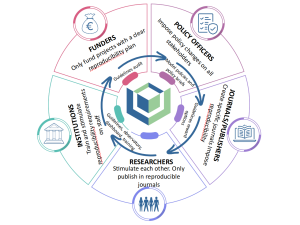Research on research is an important part of the LORIER programme. The aim of this page is to present research projects carried out in collaboration with Inserm teams. Please let us know if you would like your projects to be featured on this page.
OSIRIS (open science to increase reproducibility in science)
It is thought that open science practices – such as the a priori registration of protocols or the sharing of data – increase the transparency and reproducibility of our research. The European consortium OSIRIS –Open Science to Increase Reproducibility in Science – funded by Horizon Europe (Grant agreement n° 101094725) aims to verify this. Its aim is to develop, implement and evaluate the impact of open science practices on the reproducibility and transparency of scientific research.
 LORIER is involved in two projects. The first proposes to define and test methods for verifying reproducibility. To do this, we will work together to draw up a list of open science practices that can improve the reproducibility of scientific research, translate them into observable indices and then apply these reproducibility checks to a series of research projects in order to assess their impact on transparency and reproducibility.
LORIER is involved in two projects. The first proposes to define and test methods for verifying reproducibility. To do this, we will work together to draw up a list of open science practices that can improve the reproducibility of scientific research, translate them into observable indices and then apply these reproducibility checks to a series of research projects in order to assess their impact on transparency and reproducibility.
The second intervention aims to set up an observatory of open science practices and then to assess its impact on researchers’ practices. More and more dashboards based on open science indicators – such as protocol registration or data openness – are being developed, such as the French Open Science Barometer. OSIRIS aims to identify the most relevant indicators and deploy them in partner institutions to assess their impact.
Read more
If you are interested in the development and/or implementation of these “reproducibility checks” or in the observatory of open science practices, please contact us to sign up for the LORIER “reproducibility” scientific leadership group.
SHARE-CTD (sharing and re-using clinical trial data to maximize impact)
The re-use of medical research data – which is conditional on access to individual patient data – is supposed to maximise the value of medical research. It enables different hypotheses to be tested, assertions to be validated, controversies to be explored, unpublished trials to be restored, duplication of effort to be avoided and new knowledge to be produced from existing data sets. The sharing of clinical research data, because of its sensitive nature, is nevertheless a complex practice that needs to be put in place by experienced teams. The aim of the SHARE-CTD doctoral network, funded by the European Commission as part of the Marie Sklodowska-Curie Action (Grant agreement no. HORIZON-MSCA-2022-DN-01 101120360), is to train a new generation of researchers capable of making it possible to share and re-use clinical trial data, as well as measuring the impact of this practice on the clinical research ecosystem.
Eleven doctoral students will be recruited in different European cities and will take part in various research activities on the issue of sharing data from clinical trials. There will be numerous opportunities for mobility to partner institutions (METRICS at Stanford University, YODA at Yale University, etc.). SHARE-CTD also aims to create educational content and disseminate it to a wide audience, with a view to the sustainable adoption of good practice in data sharing throughout Europe. LORIER will be involved in disseminating SHARE-CTD products to Inserm.
Recruitment of PhD students is planned for 2024. If you are interested in finding out more, please contact us.
